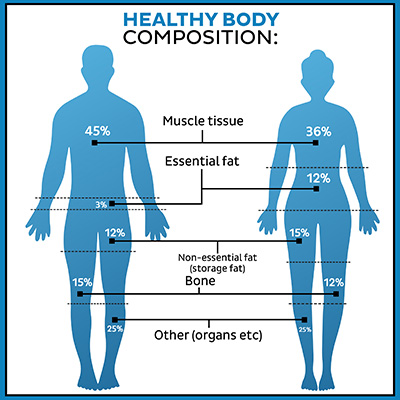Weight Fluctuates
No matter what you do, your weight is going to fluctuate. It fluctuates daily, from morning to night depending on what we eat and our water intake. If you are a woman, you might see fluctuations of several pounds in one month, even if your eating and fitness is consistent. If you want to use a scale to track weight loss, weigh yourself at the same time of day and track patterns. Get to know your body and rhythm and cycles it goes through.
Muscle Weighs More than Fat
It’s true that a pound of muscle and a pound of fat both weigh a pound. But a pound of muscle basically takes up less room in your body than a pound of fat. You might be reducing your size and getting into better shape, but there is a chance that as you gain muscle it might make you weigh the same or more than you did before you began working out. If your body fat percentage is decreasing then your program is working!
The Scale is All-Encompassing
Not only must you think about muscle versus fat, you also must consider that the scale is weighing your total body. When you step on the scale, you’re weighing muscle, fat, organs, bones, anything you are wearing, and anything you have put into your body that day. If you weigh yourself at the end of a day you’ll see your weight fluctuate naturally. However, this does not mean that what you ate or drank will be converted to fat. When you weigh yourself in the morning, you’ll likely see a change.
Weight Does Not Equal a Healthy Body
The number on the scale is not always an accurate reflection of someone’s health. A person 10 or 20 pounds overweight might actually be healthier than someone at their ideal weight. Why? Because they could have more lean muscle and less body fat. Serena Williams is a great example. She is 5’9”, weighs 155 pounds and her body fat percentage is 24%. She is a 35 year old healthy, fit woman. You could compare Jody S., 5’9”, 145 pounds with 33% body fat and much lower lean muscle. She would not be as healthy as Serena comparatively based on body composition.
Body Composition Changes
Body composition is your muscle to fat ratio and it changes depending on your exercise and nutrition habits. If you have a lower body composition ratio, then you have more muscle and less fat which is far more important than the number on the scale. It’s a sign of a healthy body and that’s the goal – to live a healthy lifestyle.
Clothes Tell the Truth
How your clothes fit can be one of the best ways to determine if your hard work is paying off. Dropping a size can be much more satisfying than a number on the scale. It’s also more realistic because when you have trouble zipping up your jeans, you know it’s time to take action. Don’t let that number on the scale ruin your day. It’s worth it to have an honest look at your overall body composition so you know what to do. Tracking your progress can help you get the results you want.
Curious about your body composition and your body fat percentage? Click here for more information!

